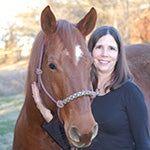As horse owners, we hate to not feed our horses. By that, I don’t mean we are starving any horse—although some of them make us feel that way when we have them on a diet! We love our chunky ponies, donkeys, and horses. And they are very good at “pushing our buttons” at mealtime and in between!
The question is: what do we do with those animals gunning for the next girth size at mealtime?
Getting Overweight Horses the Nutrients
If you look at the feeding rate for most horse feeds, it calls for feeding four to six to 12 pounds of feed per day, depending on the horse!
For many of our retired, idle, or easy-keeper horses, that feeding regimen provides way too many calories for the horse each day!
We also know that those horse feeds have been created to provide appropriate vitamins, minerals, and amino acids based on a specific feeding rate. That means you can’t just feed a quarter or half of the amount and still provide all the nutrition the horse needs each day.
Most owners would rather deal with a hard keeper than an easy keeper. But, the nutritional needs are critical for both types of horses.
The “Fat Horse Syndrome” of Horse Owners
This isn’t something that the horse has. “Fat horse syndrome” is something that horse owners have. They have become so worried about overweight horses that they now just have stopped feeding them anything but hay. Often, they have reduced the quantity and quality of hay, as well, which is a basic nutrition issue!
Some horse owners think that if you have a fat horse, you don’t need to feed it anything but hay or grass. They think if the forage meets the horse’s calorie needs (it isn’t getting thinner), that it is also meeting all of its other nutritional needs.
Unfortunately, while we want forage to be the foundation of a horse’s diet, the horse often can’t get everything it needs nutritionally from just forage. Even the most beautiful pastures or hay often can’t supply the level of vitamins, minerals, and amino acids that a horse needs daily. (Author’s note: Check out the article and podcast about how stress affects nutritional needs.)
So where is that middle ground of keeping horses at a proper weight and still providing the nutrition they need?
Get Out the Equine Nutrition Toolbox!
The good news is that in the horse owner’s nutritional toolbox consists of products called ration balancers.
Ration balancers are good (and safe) for the horse and horse owners feel like they are giving the horse “something” when everyone else in the barn is getting fed. The horses aren’t tearing down the walls or sulking (both of which are stressors for that animal) and you are providing the nutrition that the horse needs.
For all of us who love our horses and want to keep them happy, providing that small serving of a ration balancer as that animal’s “meal” means the horse is happier and less stressed - and so are we!
There are options for ration balancers depending on your horse and your management. Make sure to check with the feed manufacturer to determine which ration balancer is the best fit for your horse.
The nutrients provided from a ration balancer (and not provided in high enough levels from forage) are important to your horse’s immune system, digestive system, hair coat, and hooves. Forage is the foundation of any horse’s diet, but horse owners need to supply a ration balancer, at the very least, to supply the horse with everything that they need.
For more information on feeding your overweight horse, check out our article “Properly Feeding The Overweight Horse”

